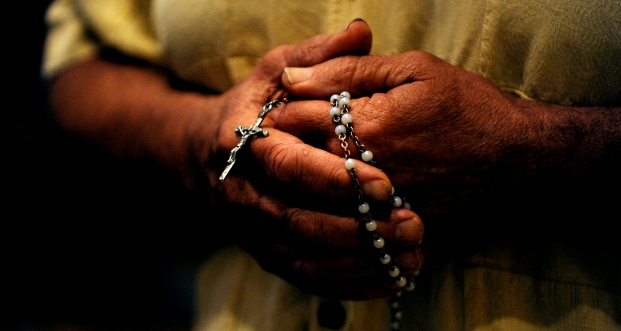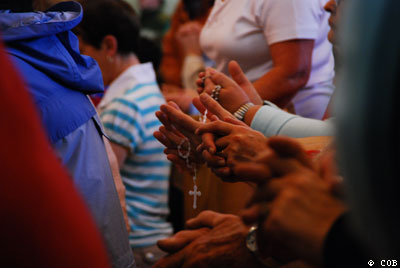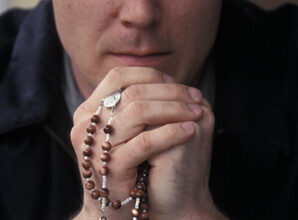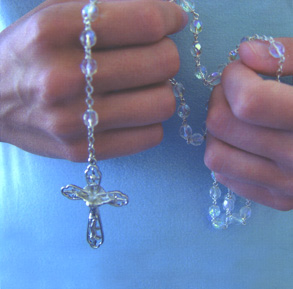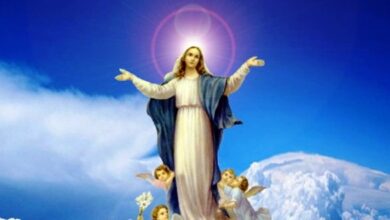The Secret Of The Rosary – First Decade – Part 2


(St. Louis Marie de Montfort)
{play}images/stories/audio/The secret of the Rosary – decade 1-2.mp3{/play}
Sixth Rose
From the time Saint Dominic established the devotion to the holy Rosary up to the time when Blessed Alan de la Roche re-established it in 1460, it has always been called the Psalter of Jesus and Mary. This is because it has the same number of Hail Marys as there are psalms in the Book of the Psalms of David. Since simple and uneducated people are not able to say the Psalms of David, the Rosary is held to be just as fruitful for them as David’s Psalter is for others.
But the Rosary can be considered to be even more valuable than the latter for three reasons:
-
Firstly, because the Angelic Psalter bears a nobler fruit, that of the Word incarnate, whereas David’s Psalter only prophesies his coming;
-
Just as the real thing is more important than its pre-figuration and the body surpasses the shadow, so the Psalter of our Lady is greater than David’s Psalter, which did no more than prefigure it;
-
Because our Lady’s Psalter or the Rosary made up of the Our Father and Hail Mary is the direct work of the Blessed Trinity.
Here is what the learned Carthagena says about it:
The scholarly writer of Aix-la-Chapelle says in his book, The Rose Crown, dedicated to the Emperor Maximilian: “It cannot be maintained that Salutation of Mary is a recent innovation. It spread almost with the Church itself. For at the very beginnings of the Church the more educated members of the faithful celebrated the praises of God in the 150 psalms of David. The ordinary people, who encountered more difficulty in divine service, thus conceived a holy emulation of them…. They considered, which is indeed true, that the heavenly praises of the Rosary contained all the divine secrets of the psalms, for, if the psalms sing of the one who is to come, the Rosary proclaims him as having come.
That is how they began to call their prayer of 150 Salutations “The Psalter of Mary,” and to precede each decade with an Our Father, as was done by those who recited the psalms.”
The Psalter or Rosary of our Lady is divided into three chaplets of five decades each, for the following reasons:
-
to honour the three persons of the Blessed Trinity;
-
to honour the life, death and glory of Jesus Christ;
-
to imitate the Church triumphant, to help the members of the Church militant, and to bring relief to the Church suffering;
-
to imitate the three groups into which the psalms are divided, the first being for the purgative life, the second for the illuminative life, and the third for the unitive life;
-
to give us graces in abundance during life, peace at death, and glory in eternity.
Seventh Rose
Ever since Blessed Alan de la Roche re-established this devotion, the voice of the people, which is the voice of God, gave it the name of the Rosary, which means “crown of roses.” That is to say that every time people say the Rosary devoutly they place on the heads of Jesus and Mary 153 white roses and sixteen red roses. Being heavenly flowers, these roses will never fade or lose their beauty.
Our Lady has approved and confirmed this name of the Rosary; she has revealed to several people that each time they say a Hail Mary they are giving her a beautiful rose, and that each complete Rosary makes her a crown of roses.
The Jesuit brother, Alphonsus Rodriguez, used to say his Rosary with such fervour that he often saw a red rose come out of his mouth at each Our Father, and a white rose at each Hail Mary, both equal in beauty and differing only in colour.
The chronicles of St. Francis tell of a young friar who had the praiseworthy habit of saying this crown of our Lady every day before dinner. One day, for some reason or other, he did not manage to say it. The refectory bell had already been rung when he asked the Superior to allow him to say it before coming to the table, and, having obtained permission, he withdrew to his cell to pray.
After he had been gone a long time, the Superior sent another friar to fetch him, and he found him in his room bathed in a heavenly light in the presence of our Lady and two angels. Beautiful roses kept issuing from his mouth at each Hail Mary, and the two angels were taking them one by one and placing them on our Lady’s head, while she smilingly accepted them. Finally, two other friars who had been sent to find out what had happened to the first two saw the same scene, and our Lady did not leave until the whole Rosary had been said.
So the complete Rosary is a large crown of roses and each chaplet of five decades is a little wreath of flowers or a little crown of heavenly roses which we place on the heads of Jesus and Mary. The rose is the queen of flowers, and so the Rosary is the rose of devotions and the most important one.
Eighth Rose
It is scarcely possible for me to put into words how our Lady esteems the Rosary and how she prefers it to all other devotions. Nor can I sufficiently express how wonderfully she rewards those who work to make known the devotion, to establish it and spread it nor, on the other hand, how strictly she punishes those who work against it.
St. Dominic had nothing more at heart during his life than to praise our Lady, to preach her greatness, and to inspire everybody to honour her by saying her Rosary. As a reward he received countless graces from her. This powerful Queen of heaven crowned his labours with many miracles and prodigies. God always granted him what he asked through our Lady. The greatest favour of all was that she helped him to crush the Albigensian heresy and made him the founder and patriarch of a great religious order.
As for Blessed Alan de la Roche, who restored the devotion of the Rosary, he received many privileges from our Lady; she graciously appeared to him several times to teach him how to work out his salvation, to become a good priest and perfect religious, and how to pattern himself on our Lord.
He used to be horribly tempted and persecuted by devils, and then a deep sadness would fall upon him and sometimes he would be near to despair. But our Lady always comforted him by her presence, which banished the clouds of darkness from his soul.
She taught him how to say the Rosary, explaining its value and the fruits to be gained by it; and she gave him a great and glorious privilege, which was the honour of being called her new spouse. As a token of her chaste love for him, she placed a ring upon his finger and a necklace made of her own hair about his neck and gave him a Rosary.
Fr. Tritème, the learned Carthagena and Martin of Navarre, as well as others, have spoken of him in terms of highest praise. Blessed Alan died at Zwolle, in Flanders, on September 8th, 1475, after having brought more than a hundred thousand people into the Confraternity.
Blessed Thomas of St. John was well known for his sermons on the holy Rosary, and the devil, jealous of his success, tortured him so much that he fell ill and was sick for such a long time that the doctors gave him up. One night, when he really thought he was dying, the devil appeared to him in the most terrible form imaginable. There was a picture of our Lady near his bed; he looked at it and cried with all his heart and soul and strength, “Help me, save me, my dearest Mother.” No sooner had he said this than the picture seemed to come alive and our Lady put out her hand, took him by the arm and said, “Do not be afraid, Thomas my son, here I am and I am going to save you; get up now and go on preaching my Rosary as you used to do. I promise to shield you from your enemies.”
When our Lady said this, the devil fled and Blessed Thomas got up, finding himself in perfect health. He then thanked our Lady with tears of joy. He resumed his Rosary apostolate, and his sermons were wonderfully successful.
Our Lady not only blesses those who preach her Rosary but she highly rewards all those who, by their example, get others to say it.
Alphonsus, King of Leon and Galicia, very much wanted all his servants to honour the Blessed Virgin by saying the Rosary, so he used to hang a large rosary on his belt, though he never said it himself. Nevertheless, his wearing it encouraged his courtiers to say the Rosary devoutly.
One day the King fell seriously ill and when he was given up for dead he found himself, in spirit, before the judgment-seat of our Lord. Many devils were there accusing him of all the sins he had committed, and our Lord was about to condemn him when our Lady came forward to speak in his favour. She called for a pair of scales and had his sins placed in one of the balances, while she put the large rosary which he had always worn on the other scale, together with all the Rosaries that had been said through his example. It was found that the Rosaries weighed more than his sins.
Looking at him with great kindness, our Lady said, “As a reward for the little service you did for me in wearing my rosary, I have obtained a great grace for you from my Son. Your life will be spared for a few more years. See that you spend those years wisely, and do penance.”
When the King regained consciousness he cried out, “Blessed be the Rosary of the most holy Virgin Mary, by which I have been delivered from eternal damnation.”
After he had recovered his health, he spent the rest of his life in spreading devotion to the Rosary, and said it faithfully every day.
People who love the Blessed Virgin ought to follow the example of King Alphonsus and that of the saints whom I have mentioned, so that they too may win other souls for the Confraternity of the Holy Rosary. They will receive great graces here on earth and finally eternal life. “Those who explain me will have life everlasting” (Sir. 24:31).
Ninth Rose
It is very wicked indeed and unjust to hinder the progress of the Confraternity of the Holy Rosary. God has severely punished many of those who have been so benighted as to scorn the Confraternity and have sought to destroy it.
Even though God has set his seal of approval on the Rosary by many miracles, and though it has been approved by the Church in many papal bulls, there are only too many people who are against the holy Rosary today. Such are free-thinkers and those who scorn religion, who either condemn the Rosary or try to turn others away from it.
It is easy to see that they have absorbed the poison of hell and that they are inspired by the devil; for no one can condemn devotion to the holy Rosary without condemning all that is most holy in the Catholic faith, such as the Lord’s prayer, the Hail Mary and the mysteries of the life, death and glory of Jesus Christ and his holy Mother.
These freethinkers, who cannot bear to have people saying the Rosary, often fall into an heretical state of mind without realizing it and come to hate the Rosary and its mysteries.
To have a loathing for confraternities is to fall away from God and true piety, for our Lord himself has told us that he is always in the midst of those who are gathered together in his name. No good Catholic would neglect the many great indulgences which the Church has granted to confraternities. Finally, to dissuade others from joining the Rosary Confraternity is to be an enemy of souls, because the Rosary is a means of avoiding sin and leading a good life.
St. Bonaventure says in his “Psalter” that whoever neglects our Lady will die in his sins. What, then, must be the punishment in store for those who turn people away from devotion to her?
Tenth Rose
While St. Dominic was preaching the Rosary in Carcassone, a heretic made fun of his miracles and the fifteen mysteries of the Rosary, and this prevented other heretics from being converted. As a punishment God allowed fifteen thousand devils to enter the man’s body.
His parents took him to Father Dominic to be delivered from the evil spirits. He started to pray and he begged everyone who was there to say the Rosary out loud with him, and at each Hail Mary our Lady drove a hundred devils out of the man, and they came out in the form of red-hot coals.
After he had been delivered, he abjured his former errors, was converted and joined the Rosary Confraternity. Several of his associates did the same, having been greatly moved by his punishment and by the power of the Rosary.
The learned Franciscan, Carthagena, as well as several other authors, says that an extraordinary event took place in 1482. The venerable Fr. James Sprenger and the religious of his order were zealously working to re-establish devotion to the Rosary and its Confraternity in the city of Cologne. Unfortunately, two priests who were famous for their preaching ability were jealous of the great influence they were exerting through preaching the Rosary. These two Fathers spoke against this devotion whenever they had a chance, and as they were very eloquent and had a great reputation, they persuaded many people not to join the Confraternity. One of them, the better to achieve his wicked end, wrote a special sermon against the Rosary and planned to give it the following Sunday. But when the time came for the sermon he did not appear and, after a certain amount of waiting, someone went to fetch him. He was found to be dead, and he had evidently died without anyone to help him.
After persuading himself that this death was due to natural causes, the other priest decided to carry out his friend’s plan and give a similar sermon on another day, hoping to put an end to the Confraternity of the Rosary. However, when the day came for him to preach and it was time to give the sermon, God punished him by striking him down with paralysis which deprived him of the use of his limbs and of his power of speech.
At last he admitted his fault and that of his friend and in his heart he silently besought our Lady to help him. He promised that if only she would cure him, he would preach the Rosary with as much zeal as that with which he had formerly fought against it. For this end he implored her to restore his health and his speech, which she did, and finding himself instantaneously cured he rose up like another Saul, a persecutor turned defender of the holy Rosary. He publicly acknowledged his former error and ever afterwards preached the wonders of the Rosary with great zeal and eloquence.
I am quite sure that freethinkers and ultra-critical people of today will question the truth of the stories in this little book, as they question most things, but all I have done has been to copy them from very good contemporary authors and, in part, from a book written a short time ago, The Mystical Rose-tree, by Fr. Antonin Thomas, O.P.
Everyone knows that there are three different kinds of faith by which we believe different kinds of stories. To stories from Holy Scripture we owe divine faith; to stories on non-religious subjects which are not against common sense and are written by trustworthy authors, we pay the tribute of human faith; and to stories about holy subjects which are told by good authors and are not in any way contrary to reason, to faith or to morals (even though they may sometimes deal with happenings which are above the ordinary), we pay the tribute of a pious faith.
I agree that we must be neither too credulous nor too critical, and that we should keep a happy medium in all things in order to find just where truth and virtue lie. But on the other hand, I know equally well that charity easily leads us to believe all that is not contrary to faith or morals: “Charity believes all things” (1 Cor. 13:7), in the same way as pride induces us to doubt even well authenticated stories on the plea that they are not to be found in Holy Scripture.
This is one of the devil’s traps; heretics of the past who denied tradition have fallen into it, and over-critical people of today are falling into it too, without even realizing it. People of this kind refuse to believe what they do not understand or what is not to their liking, simply because of their own spirit of pride and independence.


